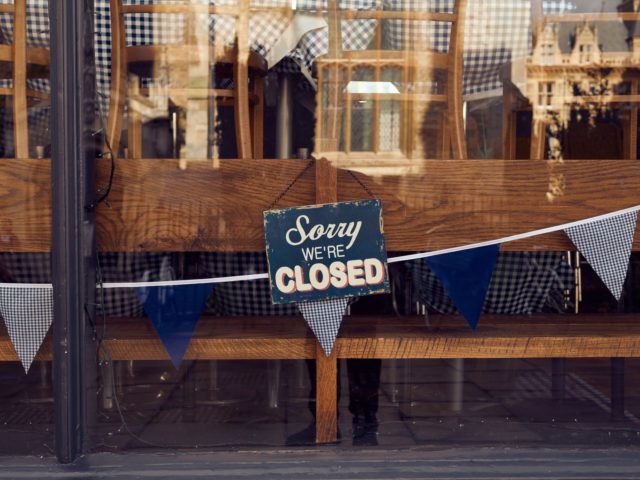The coronavirus lockdown measures in Britain will be partially lifted on Monday, however, the harsh toll of the economic shutdown has resulted in nearly 10 per cent of all restaurants closing down for good.
While pubs and bars have garnered most of the public attention, analysis suggests that the restaurant industry has been harder hit during the Chinese coronavirus crisis.
The latest Market Recovery Monitor report from CGA and AlixPartners found that the food sector has seen 9.7 per cent close from the beginning of the pandemic and casual dining has declined by a staggering 19.4 per cent. In comparison, the number of pubs and bars have been reduced by 5.4 per cent.
On net, there are 8,560 fewer licenced hospitality sector businesses than there were in March of 2020, representing a 7.4 per cent decline.
The managing director of AlixPartners, Graeme Smith said: “The progression to indoor reopening marks an important moment for hospitality and some welcome light at the end of what’s been a long, dark tunnel. Profitability in the sector remains a concern, however, and there is a bumpy road to recovery ahead.
“While some operators’ creative use of outdoor space served them relatively well over the past month, the large majority were unable to welcome back any guests or chose to remain closed. For those that did reopen, trading was beholden to the weather and many struggled to break even.”
Smith said that the “big test” will be how many businesses open up their doors after Monday’s partial lifting of restrictions.
“This may provide the best indication as to the level of permanent closures caused by the lockdown restrictions,” he said.
Just 40% of pubs were actually able to open this week. Thousands closed their doors for good during the year of government lockdowns, just the latest tragedy to befall the struggling British pub trade battling high taxes and cut-price supermarket booze https://t.co/9YbwXAxhCq
— Breitbart London (@BreitbartLondon) April 13, 2021
Speaking to the BBC, Mr Smith said that he expects further closures over the coming months and warned that the end of June will represent a “cliff-edge” for many restaurants, as landlords will be able to demand that tenants pay unpaid rent, which could trigger another wave of closures.
On a more positive note, he pointed out that pent-up demand may spur on more people to open up restaurants, saying: “When you see a restaurant closed, it doesn’t stay closed for long.”
While restrictions were slightly eased last month, allowing restaurants and pubs to cater to people outdoors, many pubs continued to either stay closed or operate at a loss due to the limited capacity imposed by the social distancing mandates.
On Monday, the industry was given a boost by finally being permitted to have indoor dining again after months of being prohibited. Yet, social distancing requirements will still be left in place.
Announcing the lifting of restrictions, Prime Minister Boris Johnson hailed the success of the United Kingdom’s vaccination programme and the “perseverance” of the public for Britain opening its economy ahead of other major European countries, such as France and Germany.
“We can now move to step three of our cautious but irreversible roadmap to freedom,” Johnson said.
A full reopening of the British economy is expected to come in June, however government ministers and Mr Johnson himself have expressed concern about the possibility of the so-called Indian variant of the coronavirus derailing the roadmap.
400K Fewer Young People Employed in Britain Since the Lockdowns Began https://t.co/4AxcwLh0mt
— Breitbart London (@BreitbartLondon) April 20, 2021
Follow Kurt Zindulka on Twitter here @KurtZindulka

COMMENTS
Please let us know if you're having issues with commenting.